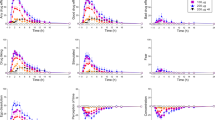Summary
Beta-adrenoceptor antagonists (beta blockers) are a well-established first-line treatment for hypertension, but they have been associated with unwanted symptoms including cold extremities, lethargy, and nightmares. Ketanserin is a serotonin S2-receptor antagonist that has previously been shown to reduce blood pressure in hypertensive patients by reducing systemic vascular resistance. Hypertensive patients whose sitting diastolic blood pressure was ≥95 mmHg, despite at least 4 weeks therapy with an optimal dose of beta blocker, were selected for the study. The beta-blocker dose remained constant throughout the study, but patients were randomly allocated to receive ketanserin 20 mg twice daily, ketanserin 40 mg twice daily, or bendrofluazide 5 mg each morning plus placebo at night in addition to the beta-blocker therapy. One hundred and forty two patients completed the symptom questionnaire at randomization and after 12 weeks treatment. The treatment groups were well matched for age, sex, weight, and blood pressure. Blood pressure was reduced significantly by all treatments, and there were no between-group differences. Bendrofluazide adversely affected alertness (p<0.05) and concentration (p<0.01) whereas ketanserin had no significant effect and the ketanserin 20 mg twice daily group had better concentration than the bendrofluazide group (p<0.05). Ketanserin treatment reduced the incidence of nightmares (p<0.05 for 20 mg twice daily and 40 mg twice daily) and was an improvement over bendrofluazide treatment in this respect (p<0.05).
Leg pain on walking (p<0.01) and at rest (p<0.05) was worse on bendrofluazide, whereas ketanserin treatment 20 mg twice daily improved incidence of leg pain on walking (p<0.05) and was an improvement over bendrofluazide treatment in this respect (p<0.05). Incidence of flushing was reduced by ketanserin 40 mg twice daily (p<0.01) more effectively than by bendrofluazide treatment (p<0.05).
The present study indicated that serotonin antagonism by ketanserin can reduce the nightmares and sleep disturbance and reverse the deterioration in peripheral circulation that may accompany treatment with beta blockers.
Similar content being viewed by others
References
Cruickshank JM, Pritchard BN, eds. Beta-Blockers in Clinical Practice. London: Churchill Livingstone, 1988.
MRC Working Party on Mild to Moderate Hypertension. Adverse reactions to bendrofluazide and propranolol for the treatment of mild hypertension. Lancet 1981;2:539–543.
Vanhoutte P, Amory A, Birkenhagor W, et al. Serotonergic mechanisms in hypertension—focus on the effects of ketanserin. Hypertension 1988;11:111–133.
Turner JF, Gould SE, Welburn PJ, et al. The effect of antihypertensive treatment on the assesement of well-being in a general practice population. J Hypertens 1987; 5(Suppl 5):S529-S531.
Seigel S. Nonparametric Statistics for the Behavioral Sciences. Tokyo: McGraw-Hill Publishers, 1956.
Korlipara K, Gould SE, Taylor NA, et al. Comparative trial of ketanserin or bendrofluazide as add-on therapy in hypertensive patients uncontrolled on a β-blocker alone. Drugs 1988;36(Suppl 1):130–134.
Kostis JB, Rosen RC. Central nervous system effects of β-adrenergic blocking drugs: The role of ancillary properties. Circulation 1987;75(1):204–212.
Hammond G, Idzikowski C, Burton S, Jones R. The effects of chronic ritanserin treatment and withdrawal on sleep. Psychopharmacology 1988;96(Suppl):S295.
Dunleavy DLF, Maclean AW, Oswald I. Debrisoquine, guanethidine, propranolol and human sleep. Psychopharmacology 1971;21:101–110.
Idsikowski GI, Cowen PJ, Nutt D, et al. The effects of chronic ritanserin treatment on sleep and neuroendocrino response to L-tryptophan. Psychopharmacology 1987;93:416–420.
The PACK Trial Group. Randomized trial of ketanserin for prevention of atherosclerotic complications. Br Med J 1989;298:424–430.
Coffman JD, Dormandy JA, Murray GD, et al. International study of ketanserin in Raynaud's phenomenon. Data presented at International Symposium on Serotonin From Cell Biology to Pharmacology and Therapeutics. Florence, Italy, March 1989.
Tooke JE. Ketanserin and peripheral blood flow. In: Serotonin Antagonists in Hypertension — Proceedings of an International Symposium. Birmingham, 30th May, 1985. Update-Siebert, 1985.
Tomlinson IW. Monitoring cutaneous circulation in Raynaud's phenomenon with observations on ketanserin. Adv Microcirculation 1985;12:37–52.
Gustafsen J, Lendord A, Raskow H, Boesby S. Ketanserin versus placebo in carcinoid syndrome. Scand J Gastroenterol 1986;21:816–818.
Author information
Authors and Affiliations
Additional information
representing the KTN 165 study group
Rights and permissions
About this article
Cite this article
Korlipara, K., Gould, S.E., Taylor, N.A. et al. Serotonin antagonism reduces the adverse symptoms of beta blockade. Cardiovasc Drug Ther 4, 127–131 (1990). https://doi.org/10.1007/BF00053444
Issue Date:
DOI: https://doi.org/10.1007/BF00053444




